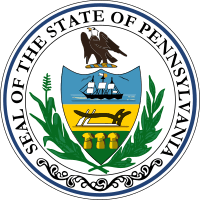1971 Philadelphia mayoral election
The Philadelphia mayoral election of 1971 saw the election of Frank Rizzo.
| Turnout | 77%[1] | ||||||||||||||||
|---|---|---|---|---|---|---|---|---|---|---|---|---|---|---|---|---|---|
| |||||||||||||||||
| |||||||||||||||||
| Elections in Pennsylvania | ||||||||||||||
|---|---|---|---|---|---|---|---|---|---|---|---|---|---|---|
 | ||||||||||||||
|
||||||||||||||
|
||||||||||||||
|
||||||||||||||
|
||||||||||||||
Democratic primary
Candidates
Declared
- William J. Green III, U.S. Representative from Pennsylvania's 5th congressional district
- Ira Einhorn, counterculture figure and future convicted murderer
- Frank Lomento, pretzel vendor
- James E. Poole
- Albert Sprague, member of Local 141 of the Lithographers and Photo Engravers International Union[2]
- Frank Rizzo, Police Commissioner and acting Mayor
- Hardy Williams, State Representative from the 191st district
Withdrew
- David Cohen, former City Councilman (endorsed Green)
Campaign
Rizzo had a reputation for his harsh policing style, and as called "the toughest cop in America".[3] He began his candidacy as the frontrunner for the nomination, with the endorsement of the city's Democratic organization.[3]
Rizzo refused to debate or attend the same events as his opponents.[3] Green refused to discus most issues, and avoided interviews or written questions by the media or civic groups.[3] He also refused to join his opponents in testifying on the city's financial problems before the Philadelphia City Council.[3] Rizzo also did not make many campaign appearances, making only a single appearance a day and only appearing in white ethnic neighborhoods considered to be friendly towards him.[3]
Rizzo repeatedly insisted that he was "not a politician".[3] Rizzo took a position against additional taxes.[3]
Rizzo had earned goodwill with many voters, who perceived his command of the police department as having staved off the sort of violent rioting other cities had experienced years earlier.[3]
Green warned voters that it would be a "disaster" if America's then-fourth largest city were to be led by Rizzo.[3]
Liberal politicians primarily supported Green.[3] Shortly before the primary, governor Milton Shapp endorsed Green (after which Rizzo attacked Shapp's record).[3]
Green's camp had attempted to get Williams to withdraw, in order to unite liberal voters around Green and against Rizzo. Williams refused.[3]
Williams was the first well-known African American to run for mayor of Philadelphia.[4]
After Shapp accused Rizzo of police brutality and Pennsylvania Attorney General J . Shane Creamer found Rizzo guilty of having beaten a black demonstator in 1965, Rizzo dismissed this as a political "cheap shot".[3]
The Philadelphia Bulletin argued that the real race was not between Rizzo and Green, but between incumbent mayor Tate and governor Shapp for control of the Philadelphia Democratic Party.[3] This newspaper declined to endorse a candidate.[3]
Results
| Party | Candidate | Votes | % | |
|---|---|---|---|---|
| Democratic | Frank Rizzo | 176,621 | 48.86% | |
| Democratic | William J. Green III | 127,902 | 35.38% | |
| Democratic | Hardy Williams | 45,026 | 12.46% | |
| Democratic | David A. Cohen | 4,176 | 1.16% | |
| Democratic | James E. Poole | 2,774 | 0.77% | |
| Democratic | Frank Lomento | 2,454 | 0.68% | |
| Democratic | Albert Sprague | 1,534 | 0.42% | |
| Democratic | Ira Einhorn | 1,022 | 0.28% | |
Republican primary
Candidates
Declared
- Thacher Longstreth, At-large City Councilman and candidate for Mayor in 1955
Results
Longstreth faced only nominal opposition for the nomination.[3]
Independents and third parties
Conservative
- Joseph J. Frieri, candidate for Mayor in 1971
Constitution
- Clarissa Cain, candidate for City Controller in 1969 and Governor in 1970
Socialist Labor
- George S. Taylor, perennial candidate
Socialist Workers
- Jean Savage
General election
Campaign
Rizzo's campaign slogan "Rizzo means business".[5] Rizzo benefited from white racial backlash.[5] He campaigned primarily in white, working class areas of the city.[5]
Results
| Party | Candidate | Votes | % | |
|---|---|---|---|---|
| Democratic | Frank Rizzo | 394,067 | 52.87% | |
| Republican | Thacher Longstreth | 345,912 | 46.41% | |
| Constitution Party (United States) | Joseph J. Frieri | 2,456 | 0.33% | |
| Conservative | Clarissa Cain | 1,054 | 0.14% | |
| Socialist Labor | George S. Taylor | 948 | 0.13% | |
| Socialist Workers | Jean Savage | 919 | 0.12% | |
| Turnout | 745,356 | |||
References
- Denvir, Daniel (22 May 2015). "Voter Turnout in U.S. Mayoral Elections Is Pathetic, But It Wasn't Always This Way". City Lab. Retrieved 28 April 2019.
- "5th Philadelphia Candidate". nytimes.com. The New York Times. Retrieved 10 August 2019.
- Janson, Donald (19 May 1971). "Rizzo Wins Race in Philadelphia". The New York Times. Retrieved 14 June 2020.
- Warner, Bob (20 March 2015). "Is Every Philly Mayor's Race About Race?". NBC10 Philadelphia. Retrieved 14 June 2020.
- Lamis, Renée M. (2009). The Realignment of Pennsylvania Politics Since 1960: Two-Party Competition in a Battleground State. Penn State Press. pp. 100–101. ISBN 978-0-271-08577-7.
- "Mayors of the City of Philadelphia 1691-2000". City of Philadelphia. Retrieved 28 April 2019.
.jpg)
